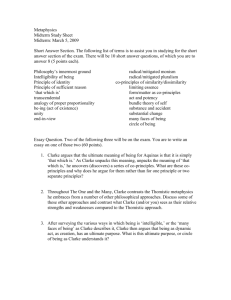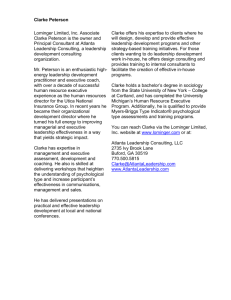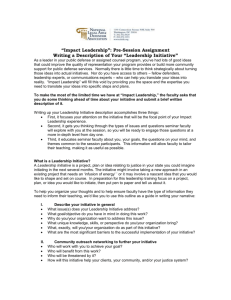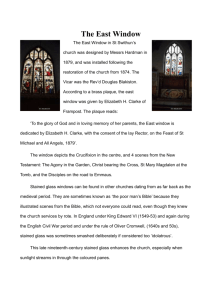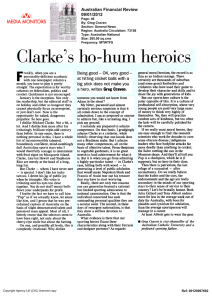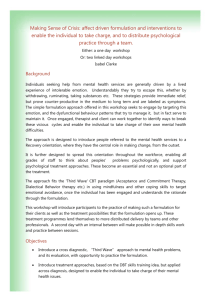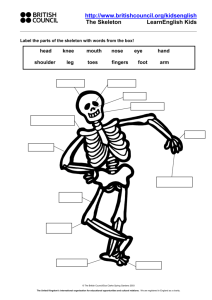Document
advertisement
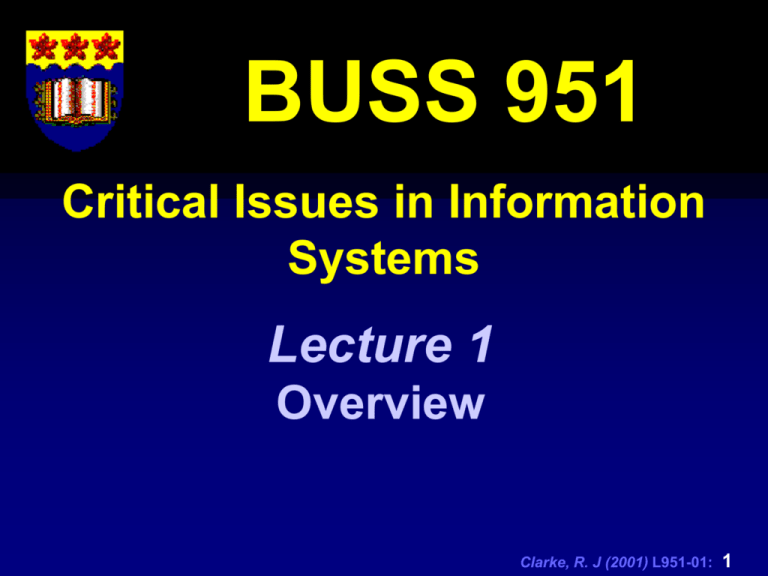
BUSS 951 Critical Issues in Information Systems Lecture 1 Overview Clarke, R. J (2001) L951-01: 1 Agenda Overview of the Subject Issues Selected Motivations Subject Outline Aim and Objectives Content and Method of Presentation Assessment Texts and Resources Schedules Safety Procedures Clarke, R. J (2001) L951-01: 2 Overview of the Subject Clarke, R. J (2001) L951-01: 3 Overview of the Subject Conflict in IS Curricula a conflict exists within most Information Systems curricula at tertiary levels in North America, Australia, and New Zealand. between preparing students for the demands of their professional careers while simultaneously empowering them with the skills to think critically about the basis of their discipline, and with a sufficiently broad training, to be able to draw from other literatures and traditions to form new theory, new method and new insights. Clarke, R. J (2001) L951-01: 4 Overview of the Subject IS Discipline is not what you think! need to demonstrate to students that the bases of their discipline are not the only ways of thinking about these issues that unorthodox knowledge may be productively applied to the fundamental interests of information systems: the analysis, design and implementation of systems in organisations Clarke, R. J (2001) L951-01: 5 Overview of the Subject Conflict found in other Disciplines this conflict is faced by many new disciplines in Universities which have until recently only had a professional status most areas of Commerce, Law, Health Services and the Caregiving Professions most noticable in those disciplines which have strong professional certification criteria to meet, such as Accountancy, where there has been continuous pressure to extend undergraduate courses from three to four years Clarke, R. J (2001) L951-01: 6 Overview of the Subject Student need exposure to other ideas students need exposure to ideas from other disciplines which might be relevant to systems development, but the IS discipline has not had the kind of disciplinary mix which characterises other social sciences while exceptions exist, for the most part students enrolled in most North American, Australian, and New Zealand information systems curricula are fed an unrelenting diet of hard systems thinking Clarke, R. J (2001) L951-01: 7 Overview of the Subject Need to look at new IS Research even significant developments in theory and practice from within the information systems discipline are rarely discussed in class an extreme example of this occurred when visiting a North American University, where I needed to explain to a Systems Analysis class the existence of a distinctly 'human centred' tradition in Scandinavia and of the existence of ‘soft systems’ thinking in the United Kingdom Clarke, R. J (2001) L951-01: 8 Overview of the Subject Move beyond ‘hard systems’ Most information systems curricula leave students with an overwhelming view that the design of systems is only possible by deploying a small range of techniques… data oriented, process oriented, object oriented …all within the same theoretical framework- ‘hard’ systems thinking Clarke, R. J (2001) L951-01: 9 Overview of the Subject History of IS Discipline Most students are not even be aware that the IS discipline arose out of a particular set of historical, economic and social circumstances Most students don't even view ‘theory’ as having a place within their future professional lives. Many students incorrectly think that information systems is theory-neutral, after all "... where just trying to provide solutions to organisational problems"! Clarke, R. J (2001) L951-01: 10 Overview of the Subject ‘Theory Neutral’ View in Methods this ‘theory neutral’ view is often implicitly reinforced when students are exposed to a range of systems development methodologies, as for the most part, the same techniques reoccur across a broad range of different methodologies, eg: Entity-Relationship-Attribute (ERA) analysis is found in database methodologies, process methodologies, and prototyping methodologies. the same with the large variety of Data Flow Diagramming (DFD) techniques, where the differences between them seem largely cosmetic Clarke, R. J (2001) L951-01: 11 Overview of the Subject Need a Critical Reflective Practice Most IS students cannot understand that: the particular type of systems thinking found in the information systems discipline is only one type of systems thinking, or that it is possible to develop systems directly from the language users employ in the workplace, or that there exists a discipline called semiotics which directly addresses meaning students are neither prepared for these ideas or empowered with a critical reflective practice to use them Clarke, R. J (2001) L951-01: 12 Issues Selected Clarke, R. J (2001) L951-01: 13 Issues Selected Must satisfy the following Criteria Only issues which satisfied the following criteria were considered for inclusion in this subject: the issue had to have a considerable ‘folk wisdom’, a ‘currency’ amongst practitioners and academics, and therefore a wide circulation or high profile within the information systems discipline the ‘issue’ must have theoretical, methodological, and substantive significance for the information systems discipline the ‘issue’ must be addressed by other ‘unorthodox’ literatures Clarke, R. J (2001) L951-01: 14 Issues Selected Defining Unorthodox Literatures & Interests By ‘unorthodox literatures’ I mean those disciplines and their literatures which would not normally be associated with the interests of the information systems discipline I define the ‘interests’ of the information systems discipline to mean the analysis, design and implementation and use of systems in organisations Clarke, R. J (2001) L951-01: 15 Issues Selected Criteria for Inclusion and Exclusion Of particular interest are those ‘unorthodox’ literatures which are only rarely used in research and teaching eg. cultural studies, critical theory, science and technological studies, history and philosophy of science, semiotics, linguistics, anthropology and ethnography Excluded are those disciplines which on the whole share related theoretical and methodological frameworks, and so management, accountancy, economics, and industrial relations figure rarely if at all as an ‘unorthodox’ Clarke, R. J (2001) L951-01: 16 Motivations Clarke, R. J (2001) L951-01: 17 Motivations (1) there is an enormous alternative literature which has a direct bearing on the IS discipline but which is only occasionally used in research and rarely used in teaching to alert students to the fact that there are ‘traditions’ within the discipline which utilise these literatures productively in the analysis and re/design of organisations, and also in the development of systems the application of unorthodox ideas should also transform methodology and practice Clarke, R. J (2001) L951-01: 18 Motivations (2) these alternative literatures have the potential for developing penetrating critiques of the information systems discipline and its practice the need for developing these critiques is becoming more obvious as the ground swell of discontent about systems in organisations increases there are also a large number of studies which indicate a lacklustre performance and a growing indifference to claims made by information systems professionals and academics new ways of thinking about information systems in organisations are urgently needed Clarke, R. J (2001) L951-01: 19 Subject Outline Clarke, R. J (2001) L951-01: 20 Safety Procedures Clarke, R. J (2001) L951-01: 21
